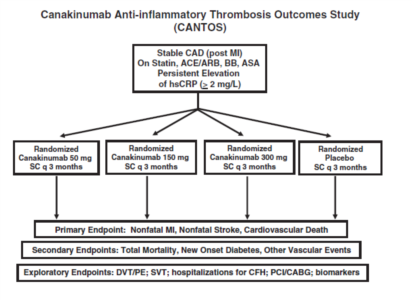CANTOS studie: remming van interleukine bij atherotrombose
Literatuur - Ridker P, : Am Heart J. 2011 Oct;162(4):597-605.Interleukin-1β inhibition and the prevention of recurrent cardiovascular events: rationale and design of the Canakinumab Anti-inflammatory Thrombosis Outcomes Study (CANTOS).
Paul M Ridker, MD, Tom Thuren, MD, Andrew Zalewski, MD, and Peter Libby, MD
Am Heart J. 2011 Oct;162(4):597-605.
Achtergrond
Ontsteking speelt een belangrijke rol in atherotrombose, gemedieerd door verschillende inflammatoire mechanismen. De inflammatoire biomarker high-sensitivity C-reactive protein (hsCRP) kan worden gebruikt om mensen te identificeren met een verhoogd vasculair risico [1]. Hoewel is aangetoond dat hsCRP grotendeels is geassocieerd met vasculaire risicofactoren [2], is het nog onbekend of de directe remming van de ontsteking het optreden van vasculaire events vermindert [3]. Een veelbelovende aanpak is remming van interleukine-1β (IL-1β), een krachtige pro-inflammatoire cytokine dat meerdere rollen speelt in het atherotrombotische proces.Canakinumab is een humaan monoklonaal anti-humaan IL-1β antilichaam dat al is geïndiceerd voor IL-1β gemedieerde inflammatoire ziekten, zoals CAPS en het Muckle-Wells syndroom. Canakinumab bindt humaan IL-1β waardoor de interactie van dit cytokine met zijn type I en II receptoren wordt geblokkeerd. IL-1β antagonisme met canakinumab resulteert in een snelle en aanhoudende remming van de acute fase respons, wat leidt tot duidelijke reducties in CRP en IL-6. Canakinumab heeft weinig invloed op lipidenwaarden, zodat de inflammatoire hypothese van atherotrombose door het remmen van ontstekingen kan worden getest zonder verstorende bijeffecten. Als gevolg van de verlengde werking van canakinumab op de acute fase respons kan het worden gedoseerd per kwartaal (SC). In het ontwikkelingsprogramma toonde canakinumab een gunstig veiligheids-en verdraagbaarheid profiel.
De primaire doelstelling van de CANTOS is om te bepalen of langdurige behandeling met canakinumab (50/150/300 mg SC elke 3 maanden) het optreden van terugkerende cardiovasculaire gebeurtenissen vermindert vergeleken met placebo bij stabiele patiënten na een hartinfarct, die een verhoogd vasculair risico houden ( hsCRP> 2 mg / L), ondanks de gebruikelijke zorg, waaronder behandeling met statines. Ongeveer 17.200 mensen (zowel mannen als vrouwen) van 18 jaar en ouder zullen worden geïncludeerd.

Samengevat kan CANTOS, indien succesvol, bijdragen aan de inflammatoire hypothese van atherotrombose en kan een nieuwe cytokine-gebaseerde therapie worden voor secundaire preventie van hart-en vaatziekten en beginnende diabetes.
Abstract
BACKGROUND:
Inflammation contributes to all phases of the atherothrombotic process, and patients with elevated inflammatory biomarkers such as high-sensitivity C-reactive protein (hsCRP) have increased vascular risk. Yet, it remains unknown whether direct inhibition of inflammation will reduce cardiovascular event rates.DESIGN:
The CANTOS will evaluate whether interleukin-1β (IL-1β) inhibition as compared with placebo can reduce rates of recurrent myocardial infarction, stroke, and cardiovascular death among stable patients with coronary artery disease who remain at high vascular risk due to persistent elevations of hsCRP (>2 mg/L) despite contemporary secondary prevention strategies. Canakinumab is a human monoclonal antibody that selectively neutralizes IL-1β, a proinflammatory cytokine that plays multiple roles in the atherothrombotic process and that undergoes activation by the nucleotide-binding leucine-rich repeat-containing pyrin receptor 3 inflammasome, a process promoted by cholesterol crystals. Canakinumab significantly reduces systemic C-reactive protein and other inflammatory biomarker levels, is generally well tolerated, and is currently indicated for the treatment of inherited IL-1β driven inflammatory diseases such as the Muckle-Wells syndrome. In a multinational collaborative effort using an event-driven intention-to-treat protocol, CANTOS will randomly allocate 17,200 stable postmyocardial infarction patients with persistent elevation of hsCRP to either placebo or to canakinumab at doses of 50, 150, or 300 mg every 3 months, administered subcutaneously. All participants will be followed up over an estimated period of up to 4 years for the trial primary end point (nonfatal myocardial infarction, nonfatal stroke, cardiovascular death) as well as for other vascular events, total mortality, adverse events, and specific clinical end points associated with inflammation including new onset diabetes, venous thrombosis, and atrial fibrillation.SUMMARY:
If positive, CANTOS would confirm the inflammatory hypothesis of atherothrombosis and provide a novel cytokine-based therapy for the secondary prevention of cardiovascular disease and new-onset diabetes.Referenties
1. Ridker PM. C-reactive protein and the prediction of cardiovascular events among those at intermediate risk: moving an inflammatory hypothesis toward consensus. J Am Coll Cardiol 2007;49:2129-38.2. Kaptoge S, Di Angelantonio E, Lowe G, et al. C-reactive protein concentration and risk of coronary heart disease, stroke, and mortality: an individual participant meta-analysis. Lancet 2010;375:132-40.
3. Ridker PM. Testing the inflammatory hypothesis of atherothrombosis: scientific rationale for the cardiovascular inflammation reduction trial (CIRT). J Thromb Haemost 2009;7(Suppl 1):332-9.

Deel deze pagina met collega's en vrienden: